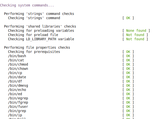Rootkit Hunter
Screenshot of Rootkit Hunter in action
Vendor: Rootkit Hunter project team
Developer: Rootkit Hunter project team
License: opensource
Web: http://rkhunter.sourceforge.net
Recommended articles
Related articles
About Rootkit Hunter (rkhunter)
Rootkit Hunter is a shell script called rkhunter, that scans your Linux operating system for rootkits, backdoors and other related security issues. It can also be used to test applications.
What are Rootkits?
Rootkits are a type of computer malware that actively hides it's existence on a computer, typically by intercepting system calls (but not limited by those means). A rootkit may open what is known as a backdoor into the compromised computer and allow a remote hacker to install software, create user accounts (with root access), change system-wide settings, steal user information (such as, but not limited to passwords, banking details etc), log user activities, delete files and/or folders, as well as other possible activity’s. Some rootkits may also be installed by legitimate companies, see http://en.wikipedia.org/wiki/Rootkit#Sony_BMG_copy_protection_rootkit_scandal for more information.
Features
- Comparing MD5 hashes
- Looking for default files used by rootkits
- Checking for wrong file permissions for binaries
- Looking for suspected strings in LKM and KLD modules
- Looking for hidden files/folders
rkhunter.Installing rkhunter
rkhunter, though YaST or your Web browser. To install Rootkit Hunter please follow one of the 2 ways below;
Using YaST
1) Open YaST (as root, see SDB:Login_as_root for help)
2) Click on Software > Software Management
3) Then click on the "Search" tab (on the top left hand corner of the "Software Management" screen)
4) Then type rkhunter and then press enter. (making sure you tick the box next to rkhunter)
5) Click on the "Accept" button. (bottom right hand corner of the "Software Management" screen)
Using your Web browser
1) Open http://software.opensuse.org/package/rkhunter?search_term=rkhunter
2) Then click the Direct Install option. (at the bottom of your screen)
Setting up rkhunter
Open the command-line (kdesu program in KDE) as root and type the following commands;
This will create a database against the file properties stored in the rpm database, of all installed software on the system.
This will update Rootkit Hunter's definitions on the rootkits out there.
Using rkhunter
Open the command-line (kdesu program in KDE) as root and type any of the following;
This option will check for rootkits and other security issues present on your system.
This option will list some of the supported capabilities of the program. The tests option lists the currently available test names (see the README file for more details). The languages option lists the currently available languages for rkhunter. The rootkits option lists the rootkits that are searched for by rkhunter. The perl option lists the installation status of the perl command and perl modules that may be used by some of the tests.
This option will check to see if there is a higher version available for your system.
This option will display the current version of rkhunter installed on your system.
As the option name suggests, this option displays help for rkhunter.
rkhunter, at http://linux.die.net/man/8/rkhunter (rkhunter's online man page)External links
See also
- Malware information on Wikipedia
- Rootkit information on Wikipedia
- rkhunter's online man page
- http://www.pctools.com/security-news/what-is-a-rootkit-virus/
- http://www.webopedia.com/TERM/R/rootkit.html
- http://www.techrepublic.com/blog/10-things/10-plus-things-you-should-know-about-rootkits/
- root user information on Wikipedia
- system call information on Wikipedia
